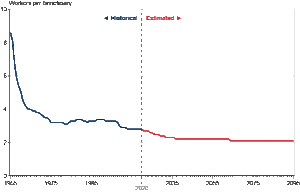So why do we have so much debt?
The federal budget can help answer that question. The largest items in the federal budget are Medicare and Medicaid, which account for more than $1.3 trillion; Social Security, which is more than $1.1 trillion; the U.S. Defense budget, which is more than $704 billion, and interest on the debt, which is nearly $343 billion.
These are not discretionary expenses. Except for the defense budget, these are payments that the government is required to make. In fact, the U.S. National Debt Clock calculates that unfunded liabilities now total nearly $156 trillion – that’s $471,152 per person.
As Jacoby wrote, “By far the largest driver of the yearly budget deficit is the chunk of money annually withdrawn from the Treasury to pay for Social Security and Medicare benefits.”
That amount, which was just $350 billion in 2016, is projected to grow to $1.5 trillion a year by 2030.
Reidl projects that Social Security and Medicare costs will account for 90% of the federal deficit between 2019 and 2030. But Social Security, which is a pay-as-you-go system, easily tops the list of budget busters.
“Over the next 30 years, the Social Security system will collect $52 trillion in payroll taxes and other … revenues and spend $74 trillion on benefits,” according to Riedl. In other words, our Social Security system will saddle our children with an additional $22 trillion in debt.
One problem is that there are a lot of retiring baby boomers – more than 77 million of them – and those who aren’t already retired will be retiring soon. Another problem is that they are living longer and collecting Social Security longer than was anticipated when Social Security was created in 1935.
When Social Security was established, the average 65-year-old would live to age 77. Today, those who survive to age 65 typically live to at least 85.
“In 1950, 16 workers paid Social Security taxes for every person collecting benefits,” MoneyWatch reported. “Today, that ratio has shrunk to 3.3 to one, and by 2034, it’s projected to be as little as two to one.”
And while the Social Security system is going broke, Medicare is already broke. Even with 77 million baby boomers retiring, Congress approved the Affordable Care Act, which shifted $716 billion in Medicare to Medicaid.
